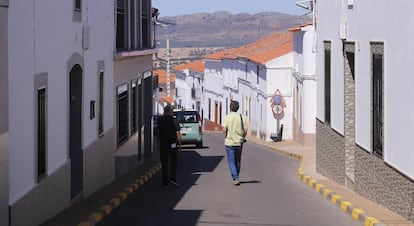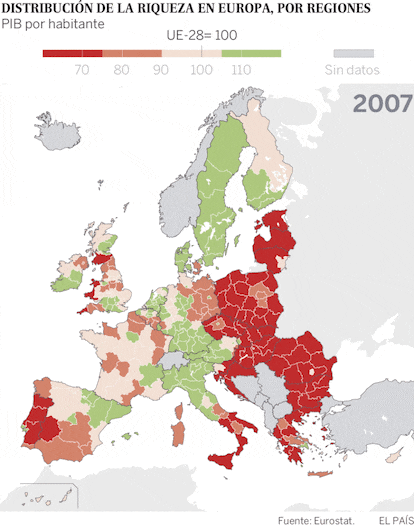Gulf between the EU’s rich and poor continues to widen despite economic recovery
According to a new report, the 2008 financial crisis consolidated regional inequality within Europe, with Spain falling far behind


In 2017, the difference in GDP per capita (at purchasing power parity) between Europe’s richest region, West London, and Spain’s poorest, Extremadura, was €168,700. That’s 41% more than it was in 2007.
The data, published early this month by the European Union’s statistics office, Eurostat, is an example of how the 2008 financial crisis consolidated regional inequality within the bloc, with wealth increasingly concentrated in Europe’s biggest capitals. Spain does not fare well: only five of its regions have GDP per capita above the European average.
This is a result of the crisis and more importantly the impact of the austerity measures
Ignacio Molina, researcher at the Elcano Royal Institute
Now the specter of a new recession has materialized before Europe has managed to heal the scars of its last crisis. According to Eurostat’s last annual report, which was published on Monday, EU’s big capital cities and their metropolitan areas have accumulated the greatest wealth over the past few years. Meanwhile, the majority of EU regions have GDP per capita that is equal to or less than the EU average of €30,900. That was the case for 59% of regions in 2007 and 62% in 2017.
In other words, the economic recovery has neither reduced the gap between EU member states nor the inequalities existing within each state.
Spain is no exception. There is a stark difference in wealth between the country’s capitals and its rural and post-industrial regions. Along with France, it is one of the countries whose regions fell furthest behind the rest of Europe between 2007 and 2017, according to the European Parliamentary Research Services (EPRS), the European Parliament’s think tank.
According to Eurostat, in only five Spanish regions – Madrid, Basque Country, Navarre, Catalonia and Aragón – was GDP per capita in 2017 above the European average. At the other end of the spectrum, in Extremadura, the exclave cities of Melilla and Ceuta in North Africa, and the Canary Islands, it was between 64% and 75% of the EU’s average.

Although per capita income has increased in almost all of Spain’s regions in the last 10 years, bouncing back to pre-crisis levels, all have lost ground against the EU average.
“The crisis has increased the income gap between regions,” says José García Montalvo, a professor at Pompeu Fabra University. “It has hit some sectors worse than others, but redistribution mechanisms have also produced uneven results.”
García Montalvo believes that Europe’s Cohesion Policy, designed to limit inequality, has not been enough to curb natural disparity. The budget for the EU’s Cohesion Policy, amounting to 1.3% of its GDP from 2021-2027, is now under discussion in Brussels.
Wealth concentration
The OECD (Organisation for Economic Cooperation and Development) has already made it clear in one of its latest reports that regions with extensive international exposure experience the fastest growth. Large capitals attracting a disproportionate amount of foreign capital, for example, are far wealthier than cities with scarce foreign investment.
“It is a general trend,” says Ignacio Molina, a researcher at the Elcano Royal Institute. “There would have been wealth concentration without the crisis, but the tendency has intensified and the crisis has exacerbated the effect.”
In 2017, West London recorded an average GDP per capita of €188,000, almost six times more than the European average, making it the richest area in Europe. Luxembourg came in a distant second with an average GDP per capita of €75,900 euros. And at the other end of the spectrum was Severozapaden in Bulgaria.
The recovery has neither reduced the gap between EU member states nor inequalities within each state
According to an article from independent think tank Center for European Reform, the most productive regions are no longer those that are highly industrialized. Being located close to a thriving city or one with a high percentage of young professional workers is also a significant factor.
This trend where wealth is concentrated in the big capitals, defined by Eurostat as “monocentric,” is also prevalent in Eastern Europe: Prague, Bratislava and Bucharest all have GDPs per capita well above the European average while the rest of the country lags far behind. Italy and Germany are the only two exceptions to this rule.
“The crisis has not affected aggregate wealth so much as its distribution,” adds Molina. “This is a result of the crisis and more importantly the impact of the austerity measures.”
As evidence starts to trickle in of an economic downturn, the challenge now is to decide where to invest. “Should the EU focus on engines of economic growth or on regions in decline?” asks Molina, who warns that always backing the same places could have more than economic consequences. “It’s about deserted Spain and the yellow vest protests in France,” he explains.
English version by Heather Galloway.
Tu suscripción se está usando en otro dispositivo
¿Quieres añadir otro usuario a tu suscripción?
Si continúas leyendo en este dispositivo, no se podrá leer en el otro.
FlechaTu suscripción se está usando en otro dispositivo y solo puedes acceder a EL PAÍS desde un dispositivo a la vez.
Si quieres compartir tu cuenta, cambia tu suscripción a la modalidad Premium, así podrás añadir otro usuario. Cada uno accederá con su propia cuenta de email, lo que os permitirá personalizar vuestra experiencia en EL PAÍS.
¿Tienes una suscripción de empresa? Accede aquí para contratar más cuentas.
En el caso de no saber quién está usando tu cuenta, te recomendamos cambiar tu contraseña aquí.
Si decides continuar compartiendo tu cuenta, este mensaje se mostrará en tu dispositivo y en el de la otra persona que está usando tu cuenta de forma indefinida, afectando a tu experiencia de lectura. Puedes consultar aquí los términos y condiciones de la suscripción digital.








































